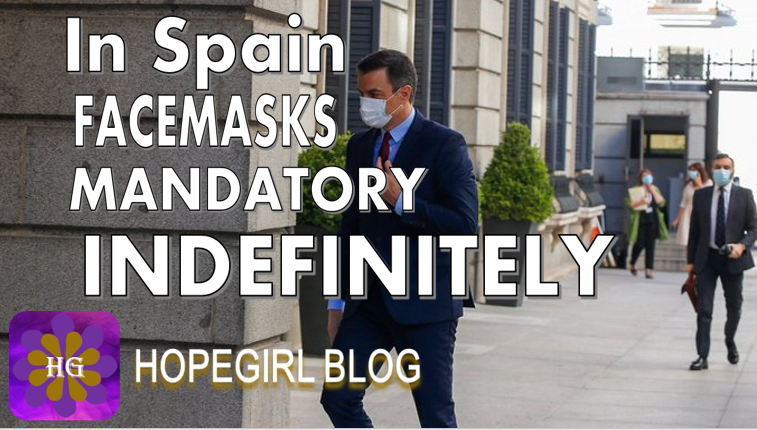The wearing of face masks will remain compulsory in Spain until a Coronavirus (Covid-19) vaccine is found, with police having the power to fine citizens for not wearing them, the government announced on Tuesday.
Source: https://www.spainenglish.com/2020/06/09/face-masks-spain-compulsory-new-normality/
It forms part of the measures within a new royal decree approved by the cabinet to establish the measures that will govern the ‘new normality’ after the ‘state of alarm’ and lockdown officially ends. The measures have been drawn up by Spain’s Ministry of Health and the Ministry of Transport.
Spanish Health Minister Salvador Illa said that the measure regarding the wearing of face masks would continue after the country’s ‘state of alarm’ concludes on 21 June – and that it would ‘remain in place until we permanently defeat the virus, which is when we have an effective treatment or vaccine against it’.
Wearing face masks in Spain has been compulsory since 21 May for everyone aged over six in closed spaces (including shops and stores), as well as on the street and in public places, if a 2-metre ‘social distance’ cannot be maintained. It had initially been made compulsory to wear face masks on all public transport in Spain since Monday 4 May.

During the ‘new normality’, wearing face masks will also remain in force on public transport, as well as for passengers in private vehicles unless they live in the same household as the driver.
Although not compulsory for very young children, it is still ‘recommended’ for those aged between three and five.
ALSO READ: Coronavirus in Spain figures (9 June)
When the ‘state of alarm’ ends and the final phase of the government’s four-phase plan of relaxing the lockdown restrictions also ends, the rule of wearing face masks will remain in place – with a fine of up to 100 euros for non-compliance — although the security distance will be reduced to 1.5 metres.
Illa said that the new regulations will come into force around 10 days before the country reopens its borders to international tourists from 1 July.
50% of Spain has now moved to Phase Three in the government’s four-phase de-escalation of lockdown plan.
We’ve published all the key rules and measures regarding the four phases in a separate report, together with the current ‘phase status’ for each region and province. The fully updated report can be found here: Lifting of lockdown in Spain – full details of all phases for all regions.

ALSO READ: Face masks compulsory in closed spaces and outside, if not at 2-metre distance
Illa also announced on Tuesday that, ‘if the state of alarm is lifted as expected, there will be unrestricted freedom of movement within the country.’
The royal decree also plans for new safety measures at workplaces and education centres, such as reorganising work stations or ensuring staff rotations to avoid overcrowding.
Special measures will also apply to the hospitality industry and restaurants, and cultural and sports facilities. Furthermore, sufficient public transport will be offered to avoid crowds.
The decree also requires the regional health authorities across Spain to be adequately staffed with specialists in epidemic ‘prevention and control’ to quickly respond to any new outbreaks.
Regional health services will have to guarantee that, at all levels of care, and especially in primary care, a suspected diagnostic test will be performed by PCR or another molecular diagnostic technique, as soon as possible.
Also, to ensure being able to trace any new cases, airlines and transport companies will have to retain details of all passengers for ‘at least four weeks’ after they have travelled.
So far the Spanish coalition (PSOE–Podemos) government has reached an agreement from the Ciudadanos (Cs) party to support the decree.













